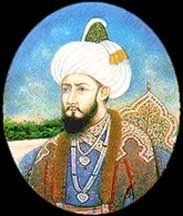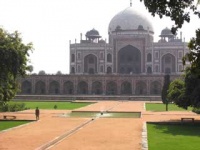Humayun: Difference between revisions
From SikhiWiki
Jump to navigationJump to search
No edit summary |
No edit summary |
||
| Line 1: | Line 1: | ||
[[Image:Hamayun.jpg|200px|thumb|right|Hamayun Jee]] | [[Image:Hamayun.jpg|200px|thumb|right|Hamayun Jee]] | ||
[[Image:Hamayuntomb.jpg|200px|thumb|left|Hamayun Jee Ka Tomb]] | |||
When Babur died, his son Humayun (1530-56) inherited a difficult task. He was pressed from all sides by a reassertion of Afghan claims to the Delhi throne, by disputes over his own succession, and by the Afghan-Rajput march into Delhi in 1540. He fled to Persia, where he spent nearly ten years as | When Babur died, his son Humayun (1530-56) inherited a difficult task. He was pressed from all sides by a reassertion of Afghan claims to the Delhi throne, by disputes over his own succession, and by the Afghan-Rajput march into Delhi in 1540. He fled to Persia, where he spent nearly ten years as | ||
an embarrassed guest at the Safavid court of Shah Tahmasp. In 1545 he gained a foothold in Kabul with Safavid assistance and reasserted his Indian claim, a task made easier by the weakening of Afghan power in the area after the death of Sher Shah in May 1545, and took control of Delhi in 1555. | an embarrassed guest at the Safavid court of Shah Tahmasp. In 1545 he gained a foothold in Kabul with Safavid assistance and reasserted his Indian claim, a task made easier by the weakening of Afghan power in the area after the death of Sher Shah in May 1545, and took control of Delhi in 1555. | ||
Revision as of 23:26, 4 January 2007
When Babur died, his son Humayun (1530-56) inherited a difficult task. He was pressed from all sides by a reassertion of Afghan claims to the Delhi throne, by disputes over his own succession, and by the Afghan-Rajput march into Delhi in 1540. He fled to Persia, where he spent nearly ten years as
an embarrassed guest at the Safavid court of Shah Tahmasp. In 1545 he gained a foothold in Kabul with Safavid assistance and reasserted his Indian claim, a task made easier by the weakening of Afghan power in the area after the death of Sher Shah in May 1545, and took control of Delhi in 1555.
| These articles deal with Mughal Empire |
|
Babur (1526-30) -|- Humayun (1530-56) -|- Akbar (1556-1605) -|- Jahangir (1605-27) -|- Shah Jahan (1627-58) -|- Aurangzeb (1658-1707) |


